"HERO PEOPLE OF THE WEEK" - Mike Ritland - Dogs With PTSD
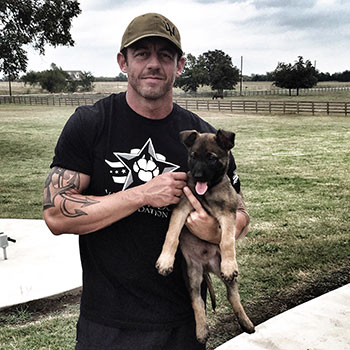 This week's Hero Award goes to former Navy Seal Michael Ritland, who created a non-profit to help military dogs transition to civilian life. Just like our human soldiers, dogs need help acclimating back into a normal environment. Small noises can cause extreme emotional distress in our enlisted canines, with dogs suffering from PTSD (Post-Traumatic Stress Disorder) just like people do.
This week's Hero Award goes to former Navy Seal Michael Ritland, who created a non-profit to help military dogs transition to civilian life. Just like our human soldiers, dogs need help acclimating back into a normal environment. Small noises can cause extreme emotional distress in our enlisted canines, with dogs suffering from PTSD (Post-Traumatic Stress Disorder) just like people do.
Mike Ritland was a Navy SEAL in Operation Iraqi and is now a Navy SEAL dog trainer and breeder and also the founder of the Warrior Dog Foundation, which helps transition dogs from an operational environment to life back home.
While Mike was in Iraq, he didn't work with dogs, but that's where his interest came from. Mike tells us there was a group of Marines with dogs that saved many men. That is when the "light switch" went off and he knew he wanted to work with and train these dogs.
After he got out of the military 2008, he started his own company and received the training contract for the West Coast Seal Team Canine Program and became their trainer for 2011 and 2012.
Mike felt this was the best of both worlds, as guys that he had been to war with, guys that he was a seal instructor with, were now dog handlers and he had the pleasure of working with them and training them and their dogs to deploy.
Along with training these dogs, Mike also established the Warrior Dog Foundation, which helps to transition dogs from an operational environment back to civilian life. He states that the Warrior Dog Foundation is essentially a vehicle to retire first and foremost special operations working dogs. They also act as a sanctuary for the dogs if they can't be adopted out, which happens to about 50-percent of the dogs. The other 50-percent, they are able to rehabilitate and adopt them out to private individuals, and in some instances families or former handlers.
Anyone who adopts these dogs needs to have experience and the environment has to be right. Mike won't even say that they're not for everyone, he says, "They are not for most people." These dogs are adopted out on basically a "First come best fit," not so much a "First come first served," basis.
Surprisingly, Mike sees many dogs coming back from war with PTSD (Post-Traumatic Stress Disorder). It is different for dogs, because they don't have the ability to reason the way people do. For example, if they have learned that helicopters are associated with an incredibly stressful environment, then they may start to shut down or show handler aggression or anxiety type behaviors when one flies over. With dogs, it is more with a negative association to certain stimulus, whether it is the environment, a sound or even the combination of the two.
The Warrior Dog Foundation is able to take whatever that negative experience is and change it into something overwhelmingly positive to the dog. They do this very slowly and graduate them to where the experience is neutral and then positive, where it no longer triggers what Mike calls, "Combat stress related issues" that they originally had.
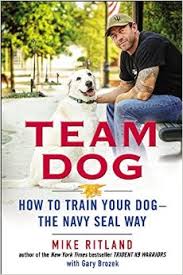 In Mike's book, TEAM DOG: How to Train Your Dog—the Navy SEAL Way, Mike uses his experiences as trainer and breeder to teach you how to train your pet at home. He begins with the most basic skill needed - how to conduct yourself to gain your dog's trust. Once you've established yourself as the team leader, you can achieve any level of traditional obedience you desire. He also helps you to understand the reasons for your dog's behavior and how to troubleshoot.
In Mike's book, TEAM DOG: How to Train Your Dog—the Navy SEAL Way, Mike uses his experiences as trainer and breeder to teach you how to train your pet at home. He begins with the most basic skill needed - how to conduct yourself to gain your dog's trust. Once you've established yourself as the team leader, you can achieve any level of traditional obedience you desire. He also helps you to understand the reasons for your dog's behavior and how to troubleshoot.
Mike's instruction will teach you how to project what the SEAL teams call situational awareness and command and control in order to:
- Establish Yourself as the Team Leader
- Master Non-Verbal Communication with your Dog
- Understand How and When to Appropriately Punish or Reward
- Master the Techniques of Clicker Training
- Create a Stable Environment for your Dog
- Maintain a Healthy lifestyle for your Dog
TEAM DOG offers an entirely unique perspective to dog training that has proven as effective in the living room or backyard as it did on the battlefield.
Mike Ritland joined the navy in 1996, and after twelve years started his own company to train dogs for the SEAL teams. His clients included the Department of Homeland Security, U.S. Customs, TSA and the Department of Defense. He is also the author of the New York Times bestseller Trident K9 Warriors.
Visit Website
Check In - Then Check Out With A New Dog!
Emma Ledbetter, Aloft Hotel
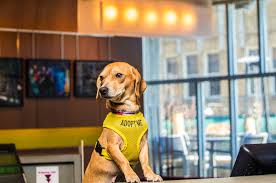 A Hotel in North Carolina is not just pet friendly, they are actually doing something very special for homeless dogs.
A Hotel in North Carolina is not just pet friendly, they are actually doing something very special for homeless dogs.
The Aloft Hotel in Asheville North Carolina helps the local shelter find homes for adoptable dogs with their unique program. So far they've found homes for hundreds of dogs. Wait until you hear how they're doing it.
They have a foster program going and work with Charlie's Angels Animal Rescue. They foster one dog at a time, with that dog staying at the hotel 24 hours a day. The dog is kept in the lobby, along with information posted about the dog. This includes the name of the dog, the breed and how long they've been at the hotel. They also wear an "Adopt Me" vest and greet the guests in the lobby.
The idea came about since the hotel is dog friendly and they thought it would be nice to have a hotel dog. They then took it one step further and decided to have one dog at a time from the rescue. It is up to Charlie's Angels Rescues to pick the dog. They need to make sure that the dog is friendly for the hotel and not a big barker or timid. The dog needs to be very friendly towards the guests.
Hotel and rescue workers hope the program spreads to some of the chain's other locations, too. They also hope that other business in the community will follow their lead. There could be many more businesses with foster dogs, such as paint stores, hardware stores and even boutiques with foster dogs waiting for their forever homes.
The Asheville hotel opened in 2012 and has not received one complaint about allergies, messes or dueling dogs!
Visit Website
Black Widow Spiders Poisonous to Pets - Dr. Debbie
 Pet Threats Come in All Sizes
Pet Threats Come in All Sizes
Our doggie family ambled along on our typical morning walk along the community trail. With a family of two Labradors and a Yorkie mix, my crew is always up for fun and they investigate anything and everything.
Sometimes it's a crunchy cockroach snack or the fortunate edible remnant in a discarded candy wrapper. My dogs enjoy the "date game" where they snatch up shriveled fruit fallen from date palms, crunching away before the mom and dad notice. And sometimes it's a half-hearted game of chase with an unsuspecting rabbit. A more gut wrenching episode once involved my Labrador ingesting a rat with tail slipping down his gullet like a piece of spaghetti. My furry kids are professional trouble finders so I try to keep a watchful eye for things that make them go "Oooh," and make me go "Ugh!"
Female Black Widow Spider
While walking along the pedestrian pathway we came upon today's discovery - spiders and lots of them living in the recesses of a block wall. The hairs on my arm stood up as my Yorkie mix approached their lair. I recognize what these spiders are and what could happen to a 16-pound pup.
The long legged spiders were over 1 1/2" in length, black in color with a distinctive orange hourglass mark on its underbelly. Meet the black widow spider, a common arachnid found in every state in the U.S. except Alaska.
The Black Widow Bite
Black widow spiders contain a potent neurotoxin that causes pain, swelling and can lead paralysis. Female black widows are the dangerous ones, while the males rarely ever bite. While some black widow bites go unnoticed, others cause immediate pain at the site or result in pain at the nearest lymph node. Pain intensity reaches its maximum within 1 to 3 hours after the bite, but can last up to 48 hours.
Symptoms of a black widow bite appear within 8 hours after bite an include muscle twitching, restlessness, rigid abdomen and difficulty breathing. Symptoms may result in high blood pressure, a racing heart rate, seizures and collapse. Dogs are more resistant to a black widow bite, but still can suffer serious illness. Cats are very sensitive to the toxins and can suffer fatalities.
Symptoms of black widow bite include:
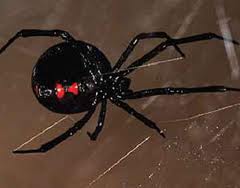 - Pain and numbness around bite site
- Pain and numbness around bite site
- Anxiety
- Racing heart rate
- Muscle pain and stiffness, especially abdominal muscles
- Difficulty breathing
- Paralysis
- Seizures
Treatment for Black Widow Spider Bite
Call your veterinarian if you suspect your pet was bitten by a black widow. Initial home emergency care of a black widow bite may include ice packing bite area and oral antihistamines like Benadryl. Your veterinarian will need to see your pet to evaluate and treat the more serious symptoms. Treatment may include medications to control muscle spasms and seizures. Blood pressure and blood sugar are monitored and intravenous fluids may be administered. An antivenin is available for more serious confirmed cases of black widow bite.
Prevention
Avoidance of spider habitats is the best prevention. These eight-legged critters favor dark recesses both indoors and outdoors. Look for cobwebs with a distinctive funnel-shaped opening at the top. And keep a close eye on your dog when out exploring. Inquire about spider control methods with your pest control company.
With pet noses so close to web level, the risk of black widow bites is just natural to being a dog. Our morning spider encounter ended without any drama, thankfully. After one firm "No!" my doggies retreated to unearth some other lucky find. Here's to hoping it doesn't involve any rats or bugs next time.
Featured veterinarian known as "Dr. Debbie" on national pet radio program, Animal Radio. Ebook author of "Yorkshire Terriers: How to Be Your Dog's Best Friend"; "Pugs: How to Be Your Dog's Best Friend"; "Mini Schnauzers: How to Be Your Dog's Best Friend"; and "Shih Tzu: How to Be Your Dog's Best Friend." Dr. Debbie's books.
Visit Website
Animal Radio News - Tammy Trujillo
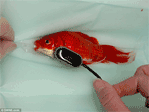 How Much Would You Spend To Save Your Goldfish?
How Much Would You Spend To Save Your Goldfish?
Most of us would do just about anything for our cat or dog. But what about a goldfish? A man in Britain loved his so much that he spent the equivalent of $460 to save the 3-inch long goldfish's life. The fish had two small tumors and needed surgery to survive. A veterinarian did the hour-long surgery. First, they put a small amount of anesthetizing agent into the goldfish's water. Once it took effect, the fish was taken out of the water and put on a waterproof drape and anesthetic water was inserted into it's mouth through a tube and bubbled over the gills. The veterinarian then used a miniature heart-rate monitor to make sure the fish was 'under' and removed two lumps with a mini scalpel. Finally, the tiny incisions were stitched closed and covered with a special 'glue' to waterproof the scales before the fish was slowly awakened.
Autistic Children Respond to Animals of All Types
We've heard about research that pet dogs can help autistic children improve their social skills. But, there was a study that said any kind of pet can help. The study was done at the University of Missouri and suggested that when pets are present, the children tend to interact and talk to others more. The study involved 70 families with children between 8 and 18 years old. Nearly 70-percent of the families had dogs and around 50-percent had cats. There were also other pets, including farm animals, reptiles, rodents, rabbits, fish, a bird and even a spider. The data reveled that children with any kind of pet in the home reported being more likely to engage in behaviors such as introducing themselves, asking for information or responding to other people's questions. The results were even more dramatic in families with dogs, especially smaller dogs.
 Heroes Come In All Sizes
Heroes Come In All Sizes
A little dachshund was hailed as a hero for saving his best friend, a huge 180-pound St. Bernard, who got out of the yard. The St. Bernard ended up stuck in a cold, muddy ditch for about 18 hours. The St. Bernard's guardian said his other dog, a tiny dachshund, was trying to let him know what happened by barking and as he said, "going crazy." In fact, the dachshund frantically barked at anyone who might have been be able to help. Finally, a passerby followed him to the ditch and the St. Bernard. It took eight police and firefighters to pull off the rescue, using backboard straps and a long spine board, just like they would for a person to save the big dog from some two feet of mud. The Dachshund was then honored for his actions by the City Council.
 Do You Wonder What Will Happen To Your Pets After You're Gone?
Do You Wonder What Will Happen To Your Pets After You're Gone?
One couple in India made sure their monkey, named Chunmun, was set when they passed away. Brijesh and Shabista Srivastava named him as their only child in their will, bequeathing him their house, other properties and all their money. They also started a fund that raised money to rescue monkeys and build centers for their rehabilitation. They bought Chunmun in 2005 when he was just a month old after seeing a man beating him with a stick alongside the road. In 2010 they had Chunmun "marry" another monkey, Bitty, and gave the pets their own room complete with air conditioning.
 Listen to the entire Podcast of this show (#1267)
Listen to the entire Podcast of this show (#1267)





